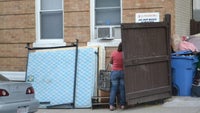

For many college students, moving off-campus can be a daunting process. First-time renters could easily get lost amid the process of determining a location and budget, touring apartments, and signing a lease.
“It’s just so tricky being young and trying to figure out what we want in a home, because it’s only our first or second time actually living by ourselves,” said Matt Yan, a rising third-year Northeastern student who moved off campus in January 2021. COVID-19 restrictions also complicated the process, as Yan was studying remotely in Washington, D.C., during that off-campus housing search.
“It’s stressful because you’re starting this whole process that’s like, adulthood: going into an apartment and knowing what you want and settling into your own place,” he said. “I think it was emotionally just kind of daunting to realize like, ‘Oh my God, this is gonna be the place that I live,’ and also we are doing a nine-month commitment, so if we really don’t like it, then we’re just gonna have to tough it out.”
Advertisement:Related stories
Luckily, many Boston-area colleges offer guidance for students looking to move into their first apartment, including school-wide housing and roommate databases, budget worksheets, lists of reputable real estate agents and more. Here is where you can get help:
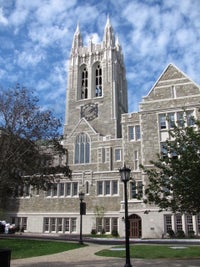
At Boston College, located in the Chestnut Hill neighborhood of Newton and Boston, roughly 13 percent of underclassmen live off-campus, usually in nearby Boston neighborhoods or suburbs. Boston College’s Off-Campus Housing office has partnered with Apartments.com to provide students with a compilation of resources specifically for Eagles to find apartments, roommates, and guidance during their housing search.

Boston University, located primarily in the Fenway/Kenmore and Allston neighborhoods, has nearly 18,000 undergraduate students, roughly one-quarter of whom live off-campus. Like many other area universities, BU has partnered with Apartments.com to provide an apartment database and university-wide roommate database for students (accessed by logging on with your BU username and password). Other resources include a list of reputable agents and brokers, budgeting resources, alternative housing options, information about tenants’ rights, and more.

Emerson College, situated in the Theater District and Downtown Boston, boasts an undergraduate population of more than 3,800, and 30 percent of its students live off-campus. Resources for students looking to move off-campus include the apartment and roommate databases, as well as an overview of how leases work and a financial education program called Money Matters, where students can attend workshops or meet individually with a financial counselor.
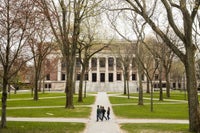
Harvard, located in Cambridge, has one of the lowest rates of off-campus living among Boston-area colleges: out of 6,700 undergraduate students, a mere 2 percent choose to live off-campus. However, the school maintains a database of apartment listings for students looking to move out of university housing, as well as a database to search for roommates and a guide to subletting.

MIT, located in Cambridge, has a similarly low number of students living off-campus, with only 8 percent of its 4,500 undergraduate students living in housing not affiliated with the university. However, there are still ample resources available to help MIT students make the leap, including a lease review service that checks for scams and illegal clauses.

Northeastern University, located in Boston’s Back Bay, Fenway/Kenmore, Roxbury, South End, and Mission Hill neighborhoods, has an undergraduate population of just over 14,200, with half of those students living off-campus. Among the many services available to students moving off-campus are an off-campus housing newsletter, a Lease Genius service that allows students to get their lease reviewed for scams and illegal clauses, and a housing guide specifically for international students.
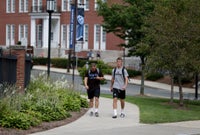
Located in Medford and Somerville, 30 percent of Tufts University’s 10,800 undergraduate students live off-campus. Along with housing and roommate databases for Tufts students, the university’s Off-Campus Housing office also provides a lease review for students seeking to avoid scams and illegal clauses.
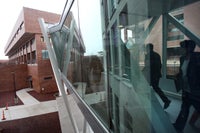
UMass Boston’s campus, located on the waterfront in Dorchester, has an undergraduate population of nearly 12,600. More than 90 percent of students live off-campus, usually in Dorchester and Quincy, but also in farther-away suburbs such as Malden. In addition to its other resources, UMass’s off-campus housing website includes COVID-19 resources and news updates.
Subscribe to the Globe’s free real estate newsletter — our weekly digest on buying, selling, and design — at pages.email.bostonglobe.com/AddressSignUp. Follow us on Facebook, LinkedIn, Instagram, and Twitter @globehomes.